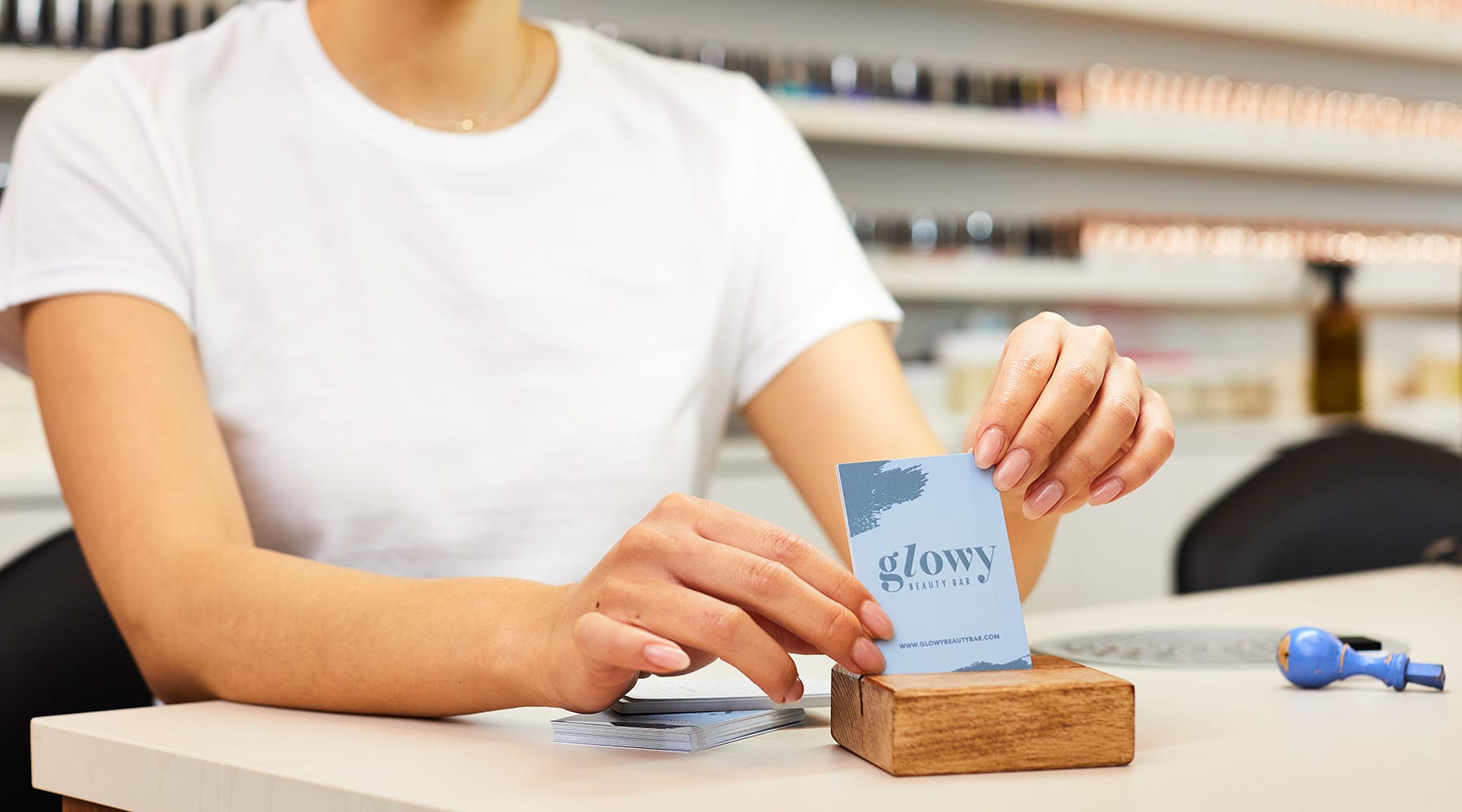Estimated reading time: 5 minutes
To effectively market your small business, you need the right tools. After all, marketing is one of the most important elements of successfully launching a new business. A collection of well-designed, on-brand marketing materials can help you connect with your ideal customers and clients, get the word out about your products or services, boost your credibility and build major buzz around your business.
But what, exactly, are the right marketing materials for small business? Let’s take a look at the 6 tools every owner should have…especially when you’re just starting out.
- A logo
- Business cards
- A website
- Postcards and flyers
- Brochures
- Social media
1. A logo
Think of your logo as the face of your business. Because it will be featured on everything related to your business (like your website, business cards and branded clothing), it will be the first design element that clients and customers associate with your brand. And as the face of your business, it’s also one of the most powerful marketing tools at your disposal.
But not all logos are created equal. You can’t throw together a generic, sloppy or unprofessional logo design and expect it to drive results. If you want your logo to effectively market your business, build brand recognition and connect with your customers, you need a logo that’s well designed and accurately represents your brand.
And, unless you’re a designer, that probably means getting a professional custom logo design. This is definitely an investment, but it’s a worthwhile one. The right logo won’t just make your branding stronger and your business more memorable, but it’ll be an invaluable piece of your small business branding package for years to come.
VistaPrint Tip
Not sure where to find a professional designer? Check out 99designs by Vista to get a one-of-a-kind look for your small business.
2. Business cards
Once your logo is designed, it’s time to create the rest of your marketing materials…starting with your business cards. When it comes to your business card design, all you need is your logo, contact information and the right dimensions. From there, you can design your card and start using it to make connections and get the word out about your business.
Business cards are an incredibly versatile small business marketing tool — you can use them to:
- Connect with clients and customers. The most traditional way to use business cards is also one of the most effective. When you meet a potential client or partner, give them a card to let them know about your business and how to get in touch with you.
- Build visibility in your community. Many small businesses rely on marketing within their local community — and business cards can be a great way to do that. You might post your business card on bulletin boards in local coffee shops or introduce yourself to other local business owners and ask to leave a stack of cards behind. The more business cards you get out into the community, the more visibility your business will have…and the more successful your marketing will be.
- Market on the fly. Opportunities to market your business can hit when you least expect — and keeping business cards on hand ensures you’re ready for anything. For example, you might meet an interested investor in the queue at the supermarket or a potential client while on holiday. If you’re prepared with a business card, you can take advantage of those chance encounters to market and grow your business on the fly.

3. A website
Most people turn to the internet when they want to find out more about a business. So, a well-designed website is an absolute must. Not only does a website lend your business credibility, but it’s a great way to share information about your offerings, build trust with clients and customers and show them why you’re the one they want to do business with.
Like your logo, your website is a marketing material that’s going to get a lot of exposure — so it’s important to nail the design. Unless you have a background in web design, you should plan to use professional website design services to make sure your final site gets you the results you’re looking for.
While an effective website design will depend on your business and your customers, here are a few universal elements you should incorporate:
- Your branding. For your website to be an effective marketing tool, people need to be able to recognise that it’s a website for your business. Make sure to leverage your brand’s colour palette and include your logo on each page.
- Contact information. Just like your business card, you’ll want to include your contact information (including your email, phone number and address) on your website.
- ‘About Us’ section. Your website offers a great opportunity to tell potential customers who you are — and an ‘About Us’ section, which tells the story of your business, is a perfect way to do it.
- Product and service information. In addition to telling your customers who you are, your website should also tell customers what you do — which means including information about the products or services you offer. (Depending on your business model, this may include selling those products and services directly on your website.)
- Opening hours. If you own a brick-and-mortar business, your customers need to know when you’re open. Include your opening hours on your website in an easy-to-find spot.
- Social media handles. Include links to your social profiles on your website so customers can easily connect with you.
4. Postcards and flyers
Postcards and flyers are some of the most versatile marketing materials for small business, especially for events or local marketing. They’re larger than a business card, so you can include more information about your business, along with interesting visuals or even a promotional offer. But like business cards, postcards and flyers are highly portable. You can leave a stack of postcards with other local business owners to reach new customers, or you can try posting flyers on local message boards to boost brand visibility. You can also slip postcards and flyers into shopping bags and packaged orders to encourage return customers. Postcards also work extremely well for postal marketing. Because of their size and finish, they tend to stand out from other types of post — making it easy to grab your customers’ attention.
Postcards and flyers come in a variety of styles, finishes and paper weights, and what you’re marketing will determine how many you should plan to order. For example, you’ll want to order a large stack for more ‘evergreen’ postcards and flyers, while you won’t need as many for limited-time promotional offers.

5. Brochures
Sometimes, you need to share a lot of marketing information with your customers — but you need to deliver that information in a compact to-go format. That’s where brochures come in handy.
Brochures can help you market your business in a variety of ways. For example, you can use a brochure to tell the story of your business, similar to the ‘About Us’ section on your website. You can use a brochure to share in-depth information about a particular product or service, to promote an upcoming event or to pitch to potential investors.
VistaPrint Tip
Once you have a brochure designed, there’s no need to start the design process from scratch when it’s time to promote something new. Instead, swap out photos and text to highlight a different product, update a discount code or change the dates for your next event — or add a QR code that brings customers to a webpage filled with news and updates.
6. Social media
An online presence is critical for any small business, especially when you’re just starting out…and beyond your website, you should be active on social media. First, consider which platforms are best for your business. Instagram is a shoppable platform that’s super visual — so if you have beautiful photography of your products, this could be a great platform for you. Do you need a place to post updates about your business, and want to have casual interactions with your customers? Turn to Twitter or Facebook. Or, maybe you already spend a lot of your free time on TikTok — why not create a separate account for your business to share tutorials or behind-the-scenes content? Regardless of what industry you’re in, social media is a marketing tool that can help you grow your audience, engage with your customers and showcase everything your business has to offer. Check out VistaCreate for free, customisable social media templates to make your content stand out.
